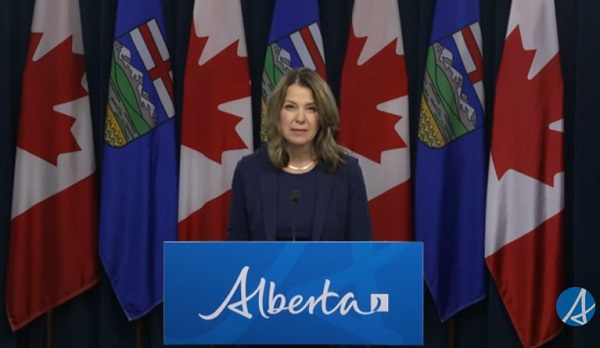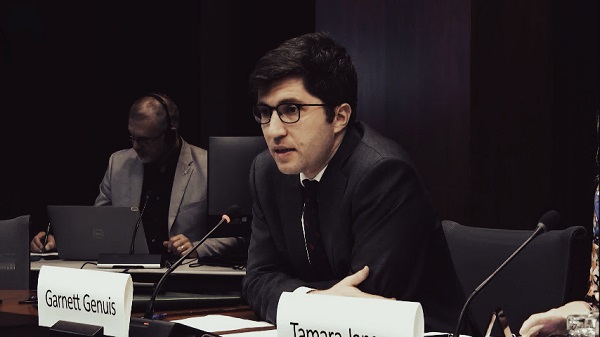Alberta
Alberta bans fires in provincial parks, protected areas, hiring 200 new firefighters, increasing fines & more

The Albert government is taking a number of steps to reduce the risk of spring wildfires while protecting municipalities.
Alberta Wildfire is hiring 200 additional firefighters, invoking a fire ban, implementing off-highway vehicle (OHV) restrictions, increasing fine violations and funding $20 million more in community FireSmart initiatives, all to prepare for the upcoming wildfire season during COVID-19.
Alberta Parks is also instituting a fire ban in all provincial parks and protected areas.
These early preparedness measures will ensure the province can effectively focus resources where they are needed most in the event of multiple emergencies happening at the same time.
Typically, the wildfire hazard is highest in Alberta in late April through May, when fuel like trees and grasses have extremely low moisture content after the snow has melted.

A massive wildfire swept through parts of Fort McMurray in May 2016, leading to the evacuation of the population and billions in damages. Photo Courtesy/Government of Alberta
More than a million acres burned last year and 71 per cent of wildfires were human-caused and entirely preventable. With provincial resources currently stretched due to COVID-19, these preventative measures will better equip Alberta’s response to spring wildfires this year.
“Albertans are tough and we’re all doing what we can to keep each other safe during COVID-19. With Alberta’s wildfire season matching with the expected peak of COVID-19, we have to take extra precautions to ensure our response efforts are well-funded and planned out. This spring, we may find ourselves facing multiple disasters at once. With all these measures, we will be prepared.” Devin Dreeshen, Minister of Agriculture and Forestry
Increased firefighting resources
An additional $5 million investment is being made to hire and train 200 high-quality firefighters to assist with the provincial wildfire suppression this season.

The fire ban and OHV restriction are temporary measures, which will remain in place only as long as required to combat the wildfire risk.
More than 800 seasonal firefighters will join 370 year-round staff at Alberta Wildfire. These resources are hired at one of the 10 Forest Areas, and are moved throughout the Forest Protection Area as required.
Fire ban and OHV restriction
A fire ban in the Forest Protection Area, provincial parks and protected areas, as well as a recreational OHV ban on Crown land in the Forest Protection Area, will come into effect April 15.
Alberta’s Forest Protection Area covers almost 60 per cent of Alberta, most of the northern half of the province and the western border, excluding federal parks.
The government recognizes that many Albertans use OHVs and respects this valid activity. At the same time, the government must take into account limitations and manage risk due to the COVID-19 pandemic. Hot mufflers can potentially start wildfires.
The fire ban and OHV restriction are temporary measures, which will remain in place only as long as required to combat the wildfire risk. Measures may later be adjusted to take into account the needs of specific regions.
All fire permits will be suspended in this area, and landowners are responsible for ensuring any holdover fires are extinguished by this time.
Indigenous people may use OHVs on public land for traditional purposes. Use of OHVs on private lands, for industrial use (for example forestry, agriculture and energy) and by emergency responders is also permitted.

A recreational off-highway vehicle (OHV) ban on Crown land in the Forest Protection These OHV restrictions are only temporary measures.
Fines are being doubled from $300 to $600 for non-compliance with a fire ban and from $600 to $1,200 for non-compliance with an OHV restriction. With 71 per cent of last year’s wildfires started by people, these fine increases reflect the seriousness of the preventative measure Albertans must take to prevent wildfires.
Individuals found contravening a fire ban or OHV restriction will be subject to increased fines, starting April 15, and could be held liable for all costs associated with fighting a wildfire. Last year, more than $600 million was spent fighting wildfires in Alberta.
These fines are in addition to the existing penalties for arson under the Criminal Code.
“Our province is taking steps to prepare for wildfires and other hazards this spring and summer by increasing our emergency response capacity. This means that while we continue to respond to the COVID-19 pandemic, we will also be ready to respond to other emergencies as they may arise.” Kaycee Madu, Minister of Municipal Affairs
Increased FireSmart funding
FireSmart will receive a funding boost of up to $20 million to support vegetation management in the province. The department will work with municipalities to ensure these funds are used this fiscal year.
FireSmart helps to reduce the wildfire risk to Albertans, their homes and communities. The FireSmart program includes grants to support the most at-risk communities in Alberta, including Indigenous communities.
This additional funding will help mitigate wildfire damages and losses in more Alberta communities by creating FireSmart zones around at-risk communities to reduce wildfire hazards.
To increase response capacity and prepare for multiple and concurrent disasters, such as wildfires and floods, the Provincial Operations Centre has been reinforced by the creation of a Pandemic Response Planning Team. This team will help coordinate government’s medium and long-term response to the COVID-19 pandemic.
Quick facts
- For more information on wildfires, download the Alberta Wildfire app.
- Up-to-date information on fire restrictions, fire bans, OHV restrictions and general wildfire information is available at albertafirebans.ca or by calling 1-866-FYI-FIRE (1-866-394-3473).
- To report a wildfire, call 310-FIRE (310-3473) toll-free, from anywhere in Alberta.
- Most new seasonal staff will be on-the-ground firefighters, with wages between $22 and $28 per hour.
- Fire bans and OHV restrictions have proven to be effective prevention tools in reducing the number of human-caused wildfires.
- Anyone found to be non-compliant with a fire ban or OHV restriction may also have to go to court and may receive a fine up to $100,000. Anyone found to be the cause of a wildfire may be liable for the costs associated with extinguishing the fire.
- FireSmart is a program that requires cooperation of all people living, working and playing in the forest.
Alberta
Premier Smith moves to protect Alberta in International Agreements

Protecting Alberta’s jurisdiction
The International Agreements Act ensures Alberta’s jurisdiction is protected and decisions that shape our future are made right here at home.
This legislation draws a clear line: international agreements that touch on provincial areas of jurisdiction must be debated and passed into law in Alberta.
Alberta, not Ottawa, will decide how international agreements that affect provincial matters apply in the province.
“As we return to the legislature, our government is focused on delivering on the mandate Albertans gave us in 2023 to stand up for this province, protect our freedoms and chart our path forward. We will defend our constitutional rights, protect our province’s interests and make sure decisions that affect Albertans are made by Albertans. The federal government stands at a crossroads. Work with us, and we’ll get things done. Overstep, and Alberta will stand its ground.”
While the federal government has the power to enter into international agreements on behalf of Canada, it does not have the legal authority to impose its terms on provinces. The International Agreements Act reinforces that principle, ensuring Alberta is not bound by obligations negotiated in Ottawa that do not align with provincial priorities.
Bill 1 was introduced by Premier Danielle Smith following the fall 2025 speech from the throne as part of Alberta’s commitment to defend its sovereignty within a united Canada.
Key facts
- If passed, the International Agreements Act will replace the International Trade and Investment Agreements Act.
- The new legislation would expand its scope beyond trade and investment to include all areas of provincial jurisdiction.
- Currently, there is no formal agreement or requirement for the federal government to consult provinces when negotiating international treaties.
- Quebec’s Act respecting the exercise of the fundamental rights and prerogatives of the Québec people and the Québec State came into force in 2000.
- International agreements do not apply in Quebec unless approved by the national assembly or the provincial government.
- Quebec must give clear consent before any international agreement takes effect.
Related information
Agriculture
From Underdog to Top Broodmare

WATCH From Underdog to Top Broodmare (video)
Executive Producers Jeff Robillard (Horse Racing Alberta) and Mike Little (Shinelight Entertainment)
What began as an underdog story became a legacy of excellence. Crackers Hot Shot didn’t just race — she paved the way for future generations, and in doing so became one of the most influential producers the province has known.
The extraordinary journey of Crackers Hot Shot — once overlooked, now revered — stands as one of Alberta’s finest success stories in harness racing and breeding.
Born in humble circumstances and initially considered rough around the edges, Crackers Hot Shot overcame long odds to carve out a career that would forever impact the province’s racing industry. From a “wild, unhandled filly” to Alberta’s “Horse of the Year” in 2013, to producing foals who carry her spirit and fortitude into future generations.
Her influence ripples through Alberta’s racing and breeding landscape: from how young stock are prepared, to the aspirations of local breeders who now look to “the mare that did it” as proof that world-class talent can emerge from Alberta’s paddocks.
“Crackers Hot Shot, she had a tough start. She wasn’t much to look at when we first got her” — Rod Starkewski
“Crackers Hot Shot was left on her own – Carl Archibald heard us talking, he said ‘I’ll go get her – I live by there’. I think it took him 3 days to dig her out of the snow. She was completely wild – then we just started working on her. She really needed some humans to work with her – and get to know that people are not scary.” — Jackie Starkewski
“Crackers Hot Shot would be one of the top broodmares in Albeta percentage wise if nothing else. Her foals hit the track – they’re looking for the winners circle every time.” — Connie Kolthammer
Visit thehorses.com to learn more about Alberta’s Horse Racing industry.
-

 Business1 day ago
Business1 day ago$15B and No Guarantees? Stellantis Deal explained by former Conservative Shadow Minister of Innovation, Science and Technology
-

 Alberta22 hours ago
Alberta22 hours agoPremier Smith moves to protect Alberta in International Agreements
-

 Business17 hours ago
Business17 hours agoLiberals backtrack on bill banning large cash gifts, allowing police to search Canadians’ mail
-

 Agriculture1 day ago
Agriculture1 day agoFrom Underdog to Top Broodmare
-

 Sports17 hours ago
Sports17 hours ago‘We Follow The Money’: Kash Patel Says Alleged NBA Ties To Mafia Just ‘The Start’ Of FBI Investigation
-

 Health17 hours ago
Health17 hours agoFor Anyone Planning on Getting or Mandating Others to Get an Influenza Vaccine (Flu Shot)
-

 Alberta2 days ago
Alberta2 days agoAlberta’s licence plate vote is down to four
-

 Bruce Dowbiggin2 days ago
Bruce Dowbiggin2 days agoIs The Latest Tiger Woods’ Injury Also A Death Knell For PGA Champions Golf?






